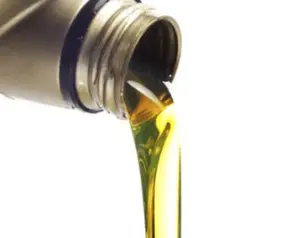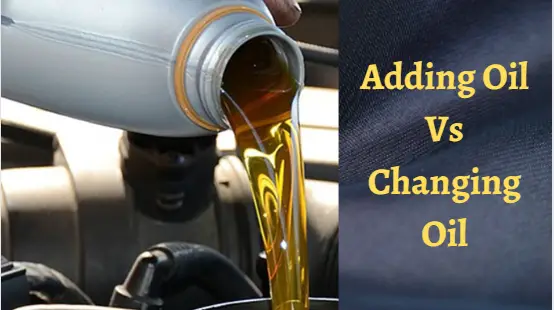I have always been a bit pedantic about my cars and like to go a few extra miles to take utmost care of them. I have a buddy with whom I always discuss cars. Once we were discussing engine oils and he told me that he mostly tops up the engine oil rather than changing it. I was surprised and decided to tell him the repercussions of doing so.
I told him that topping up the engine oil was detrimental to the engine and if he always had to top up the engine oil, then there would have been some serious issues as the level of engine oil hardly drops down. Also, an oil change means you are replacing the spoilt oil from the vehicle with fresh oil. Changing or cleaning the oil filter (as per need) is also an important part of the process. Therefore, an oil top-up can never take the place of an oil change. You must change the oil timely in order to take care of your engine’s condition.
| Adding or Topping Up the Oil | Change the Oil | |
|---|---|---|
| Frequency | Whenever the oil level is low | As per the manufacturer’s guidelines |
| Longevity | Change the oil as soon as possible. | Till the next oil change duration |
| Recommended or not recommended | Not recommended | Recommended |
| Advantages | Temporary job to take the vehicle to the nearest oil change center. | Permanent solution till the next oil change service. |
| Disadvantages | Deteriorates the engine eventually | Deteriorates the engine only if the oil change is not done timely. |
| Cost | Less | More |
| Expertise | Low | Medium |
| Performance | Not good | Optimum |
Differences between adding oil and changing oil

It is a common misapprehension that topping up oil is similar to changing oil but this is absolutely false. When you add new oil to the existing oil, the new oil does not get mixed properly with the old oil and hence its quality deteriorates.
The used oil loses its lubricating properties and has sludge and metal particles that block the flow of engine oil through the engine components.
Moreover, it is more likely that you do not clean or change your oil filter when you top up the engine oil which is detrimental to the engine. As the oil filter gets clogged with dirt and impurities, you have to clean it regularly and change it when it becomes too old, if you failed to do so, the impurities will keep running along with the engine oil and the formation of sludge will eventually result in blocking various engine components.
Advantages: Honestly speaking there are no advantages of adding or topping up oil but if it is absolutely necessary and the oil level is low, you can top up your engine oil in these circumstances. But, make sure that you change the oil as soon as possible because nothing relaxes the engine components as fresh engine oil does. If the oil level decreases after a recent oil change, then most probably there is a leakage issue and you must get that issue fixed first and then top it up with engine oil.
The easiest and most important thing that you need to take care of, is to change the engine oil as and when recommended by the manufacturer. It has immense benefits such as increasing the engine life, decreasing wear and tear in the engine components, smoother performance, good fuel efficiency, etc.
Disadvantages: There are severe outcomes if you keep topping up engine oil instead of changing it. Gradually, sludge formation occurs and the oil flow through the engine components gets restricted.
Changing the oil has no cons, however, one has to make sure to do it on time to avoid damage to the engine components
You May Also Like:-
Engine Oil vs Transmission Oil | Can They Be Used Interchangeably?
Some importance FAQs
1) Why you are forced to top up the oil frequently?
If topping up the engine oil is your continuous habit, then you should note the repercussions of doing this repetitively. Therefore, I have elaborated that if you are frequently topping off the engine oil there must be one or more issues from below:
- You were not following the oil change schedule intervals as guided by the manufacturer.
- There might be a problem with oil leakage.
- There might be a problem of excessive engine oil burn-off due to issues such as damaged piston rings or cylinder head valve guides.
2) When to add or top up oil?
The easiest way to determine whether your engine oil level is low or not is to check the engine oil light on your vehicle’s instrument cluster. Another way is to open the hood and take out the dipstick to check whether the engine oil level is below the max/low indicator. However, you should keep a few things in mind during this process:
- Make sure that the engine is cool when you take out the dipstick.
- Wipe the dipstick with a cloth, insert it completely, and only then take it out again to check the engine oil level. This will give you a piece of accurate information.
- Also, check the oil color as this will indicate if the engine oil should be replaced or not.
Note: Fresh engine oil is of light golden or blue color and used engine oil is blackish in color.
Points to note before adding/changing the oil:
- If the engine oil level is below the Min/Low indication, and the oil color is of fresh engine oil (light golden or blue), you can just top it up and you are good to go.

- If the engine oil is below the Min/Low indication, and the oil color is blackish, you need to change the engine oil. However, if you cannot do so before traveling a few miles, temporarily you can top it up, but change it as soon as possible.
- If the engine oil level is between the Max/High and the Min/Low indication, and the engine oil is light golden or blue in color, you can relax.
- If the engine oil level is between the Max/High and the Min/Low indication, the engine oil color is blackish, and you have crossed the distance covered before an oil change, you should change the engine oil as soon as possible.

- If the engine oil level is above the Max/High indication, you should remove the excess engine oil
Pro-Tip: Always make sure that the engine is cool before topping up the engine oil yourself as the hot engine can harm you and can even cause a fire if it is spilled by mistake.
3) Can I add oil to my car until I get an oil change?
Only if you cannot get an oil change, you should add oil to the existing engine oil, and make sure you change it as soon as possible.
4) Is it okay to add new oil to old oil?
No, it is damaging to your vehicle and you should not add new oil to an old one unless it is urgent. Mixing new and old oil is better to use the vehicle with a low level of engine oil.
5) Is replacing engine oil the same as an oil change?
Yes, replacing the old engine oil with the new one and oil change are one and the same thing. These are just the terms to get you confused.
Conclusion
The small etiquettes that we have for our vehicles do matter in the long run. The good habit of changing the engine oil from time to time is one of these habits. As far as I have seen in the Automobile industry, you cannot take the topic of engine oil for granted as it is the single most important thing for the health of the engine. The simple rule is to avoid topping up or adding engine oil to the existing engine oil except if the oil level is low. In all other scenarios, you should get an oil change as that is what keeps the engine up and running. The repercussions of using overused/blackish engine oil are too harsh and one should avoid this.
Therefore, by getting all these pointers in your head, the confusion of whether to add oil or to change is rested in peace and this article acts as a one-stop solution to all your confusion regarding this matter.

